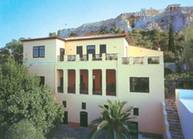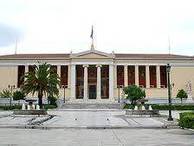School of Philosophy
Dean's Office
The School, past and present
The Past
The School is the oldest and by far the largest School of Philosophy, i.e. of Arts and Humanities, in Greece. It was founded in 1837 as one of the first four Schools of the University along with Theology, Law, and Medicine. At the time it covered both Arts and Sciences, which explains its name; it was only in 1904 that the Sciences formed an independent new School of the University.
It is interesting from the perspective of contemporary society to know that, according to the first Provisional Statutes, published in 1937 alongside the founding decree, the duration of studies was three years, but students of every subject other than the Arts, i.e. scientists, lawyers, theologians and medics were obliged to have an extra year of lectures and seminars in the Arts.

- The original building in Plaka

- The Central Building, second seat of the School

- The current Campus building
The Present
Having started life in Plaka with 18 students and 15 professors, the School of Philosophy now has a population of more than 23.000 students and a teaching staff of 300 tenured or tenure-track faculty, assisted by about 70 technicians and other teaching and research staff, spread over 13 Faculties, housed in the School of Philosophy building at the Campus on the western slopes of Mt Hymettus.
The School of Greek as a Second Language hosts a further 1.500 students, a number expected to double as soon as the School moves to its own purpose-built premises south of the School of Philosophy.
The thirteen Faculties offer an equal muber of undergraduate four- or five-year degree programmes (some with different specializations corresponding to the Departments of the Faculty) and 25 postgraduate programmes(some inter-departmental or inter-institutional and international) leading to Master's and Doctor's degrees. Several exchange agreements, chiefly within the Erasmus programme, offer students the possibility of spending part of their studies abroad.
The research carried out at the School of Philosophy has secured good ratings in international evaluations for the University of Athens in the field of Arts and Humanities. Apart from individual research, a large number of projects, several in collaboration with other universities in Greece and abroad, lead to publications and occasionally to marketable products, related mostly to teaching.
Both teaching and research are supported by the library, the 24 laboratories and the 4 museums of the School.
Faculties, Departments and Student groups organize conferences and various cultural events, including live performances, many of them at the central university building in the city centre, to make them more accessible to the public.
